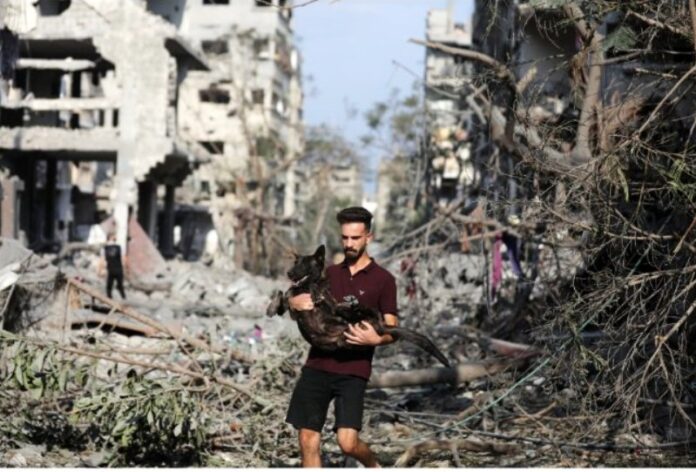An animal rescue organization in the Gaza Strip says it’s trying to keep alive not only family members amid the Israel-Hamas war, but also hundreds of dogs, cats and donkeys.
“We have already lost everything, but at least the animals are still with me,” Saeed Al Err, the founder of Sulala Animal Rescue, told ABC News.
Al Err said he and his family, including the animals he’s currently able to care for, have relocated three times since Oct. 7, when the Hamas terrorist group, which governs Gaza, launched an unprecedented surprise attack on neighboring Israel. The Israel Defense Forces retaliated with a bombing campaign and siege of Gaza, where now more than 2 million Palestinians are displaced and suffering from a lack of food, water and medicine, according to the United Nations.
In Gaza, at least 27,947 people have been killed and 67,459 others have been injured since Oct. 7, according to Gaza’s Hamas-run Ministry of Health. In Israel, at least 1,200 people have been killed and 6,900 others injured since Oct. 7, according to the Israeli prime minister’s office. Meanwhile, at least 564 Israeli soldiers have been killed since Oct. 7, including 227 since the ground operations in Gaza began, according to the IDF.
Humanitarian groups have warned that the possibility of a “full-fledged famine” looms large across Gaza amid the ongoing Israel-Hamas war, and the United Nations says almost all residents of the coastal enclave are now reliant on food aid for sustenance. Some people in northern Gaza told ABC News they’re using bird feed in place of flour to stave off starvation. The World Food Programme says roughly two-thirds of Gaza’s population relied on food aid before the start of the war and now an estimated 26% face starvation.
“Hunger and diseases have caused enormous hardship for the population of Gaza, including for some of its most vulnerable residents: thousands of pets,” Annelies Keuleers, who volunteers for Sulala from abroad and communicates with Al Err daily, told ABC News.


“There is barely enough space for people,” he told ABC News. “The logistical challenges are huge.”
Israel, supported by Egypt, has imposed an indefinite blockade on Gaza since Hamas came to power in 2007, restricting the movement of goods and people in and out of the strip. Those restrictions have tightened amid the latest outbreak of war, with Israel saying it must limit Hamas’ access to weapons.
The United Nations Relief and Works Agency for Palestine Refugees in the Near East (UNRWA) says Israel provides too few authorizations to make deliveries into some areas and that heavy fighting often makes it too dangerous for aid workers to operate. The aid arriving in northern Gaza has been particularly restricted, UNRWA says. Israel disputes the criticisms.
Israeli officials denied accusations they’re not letting enough food and aid into Gaza and blame Hamas for stealing aid. They said they conduct necessary inspections on the trucks, and also blamed the U.N. and other aid agencies for creating logistical bottlenecks.
The U.N. has disputed the Israeli officials’ claims, saying, on average, far less than 200 trucks are entering Gaza most days. U.N. officials have said excessive Israeli inspections, as well as arbitrary rejections of some aid, frequently hold up deliveries.

On New Year’s Eve, a truck containing 2 tons, or about 4,400 pounds, of pet food organized for Sulala by Australian animal protection organization Animals Australia made it to the Egyptian-controlled Rafah border crossing, according to Keuleers. Animals Australia posted about its donation on Instagram in mid-January, writing that it sent “an initial two tonnes [sic] of animal food and extensive veterinary supplies to the Rafah border.”
“We received news that a truck carrying 2 tons of animal food and medicine was approved on the Israeli side and we are waiting for it to arrive inside Gaza any day now,” Keuleers told ABC News earlier this month. “It’s enough for maybe a month. We are already searching for other donations.”
As of today, Keuleers said they are still waiting for this truck carrying animal supplies to be allowed inside Gaza.
“So we are still waiting,” she added.
Animals Australia also told ABC News the aid they helped organize for Sulala is stuck at the crossing, saying “increased attacks” in the area is “hindering its entry.”
ABC News reached out to UNRWA about the truck Keuleers says they are waiting on, but the request for comment wasn’t immediately returned.

Inside Gaza, as they wait for some sort of aid, Al Err said he and his family are searching for a new location for their animals, fearing another possible attack from the Israeli forces.
“The army is closing on us once again,” Al Err told ABC News.
Although space and resources are lacking, Al Err said he continues to rescue more pets. Last week, he said he found a German shepherd from an area whose residents were ordered to evacuate three weeks ago. “The poor thing was starving, so it’s good that he’s with Saeed now,” Keuleers told ABC News as she got the news from Al Err.
Al Err said his eight children all support his mission. While the older ones — Celine, Sa’ed, Mubarak and Mohammad — help him with the fieldwork, he said, the younger ones are in charge of the cats. He said his youngest, 6-year-old Diana, used to join him on “feeding tours” for stray animals when the organization still had food.
“They feed them, clean after them and especially, they play with them,” Al Err told ABC News.
“I was so happy. It really made my day to see them,” Al Err said. “Some were very skinny and that made me worry even more about the ones that were still left behind. Others seemed healthy. I felt great relief when they reached me, and I also felt hope. Those times are the only ones during the war I felt happy.”
Sulala continues to receive donations, but the rescue organization says they’re useless if aid cannot get in. “My greatest fear is having to leave behind the animals or having to leave Gaza and having to sit in a tent not knowing what will happen to them,” Al Err said.
“The animals rely on me,” he added. “I have no other choice, this is my duty.”
INFO: abcnews














